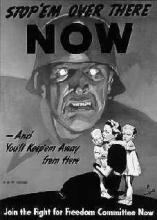World War II

Collections about World War II at Princeton include personal remembrances by participants in that conflict, the records of organizations that intervened to promote particular policy aims during the war, and records of organizations that participated in post-war reconstruction.
Collections with Divisional Holdings
-
Committee to Defend America By Aiding the Allies Records
Consists of files relating to the political, educational, and fund-raising activities of the Committee to Defend America by Aiding the Allies. Included are 1) correspondence (such as that of Roger S.
-
Charles T. Lanham Papers
The Charles T. Lanham Papers documents the general’s WWII and post war military service, his private sector employment with several corporations, and his extensive correspondence from 1944 until his death in 1978. The papers contain correspondence, scrapbooks, photographs, journals, speeches, and legal documents. The materials that compose the private sector series, the majority of which are correspondence, document his individual work and the activities of the Market Relations, Penn Texas, and Xerox corporations.
-
Bernard M. Baruch Papers
This collection consists consists primarily of public papers relating to Baruch's various involvements in government affairs. It includes several runs of office correspondence as well as a small amount of personal correspondence. Among the Political Activities documented in this collection are his involvement in the War Industries Board, the American Commission to Negotiate Peace, the Council of National Defense, the National Industrial Conference, the Saratoga Springs Commission, the Rubber Survey Committee, the War and Post-War Adjustment Unit of the U.S.
-
American Civil Liberties Union Washington, D.C. Office Records
Material in the two series includes correspondence, memoranda, telegrams, reports, legal briefs and pleadings, testimony, press releases, publications, and magazine and newspaper clippings. Series 1, Irving Ferman Records, contains more administrative documents than does Series 2, Lawrence Speiser Records, which consists largely of case files. Speiser's records also contain files that pre-date his position as director of the Washington, D.C. Office.Both series contain similar headings and subheadings.
-
William W. Lockwood
The bulk of the William W. Lockwood Papers relate to the American Institute of Pacific Relations (IPR). These papers specifically document the IPR and Lockwood's activities within the IPR during the McCarthy era, and include minutes, correspondence, conference reports and IPR research projects and publications. A significant amount of the IPR papers concern the investigation of the IPR by Senator Joseph McCarthy and Senator Pat McCarran and the subsequent 1952 Senate Judiciary Subcommittee hearings on the alleged Communist activities of the organization and some of its members.
-
American Civil Liberties Union Records: Subgroup 2
These Records document the activities of the American Civil Liberties Union (ACLU) in protecting individual rights between 1947 and 1995. The collection contains correspondence, clippings, court documents, memoranda, printed matter, minutes, reports, briefs, legal files, exhibit materials, and audio-visual materials.
-
William E. Colby Papers
The William E. Colby Papers reflect primarily Colby's post-CIA career as a consultant in international relations. However, there is a small amount of materials from his tenure at the CIA, including the texts of his testimony before Congress. Also of interest is material relating to the forty-year reunion of OSS officers who had served in France and Norway (including a thesis manuscript on the group's activities during the war).
-
American Civil Liberties Union Records: Subgroup 1, The Roger Baldwin Years
The American Civil Liberties Union Records, The Roger Baldwin years, document the activities of the ACLU from 1917 through 1950. The files contain materials on conscientious objection, freedom of speech, academic and religious freedom, censorship, labor rights, the Espionage Act of 1917, political demonstrations, political propaganda, the Ku Klux Klan and other patrioteering organizations, mob violence, racism, lynching, and other civil liberty issues. Materials include correspondence and newspaper clippings.
-
William Alfred Eddy Papers
Consists of papers of Eddy (Princeton Class of 1917). Included are notes and articles (and drafts) concerning his interests in the Arabic language, 18th-century literature, and Jonathan Swift; Hobart College presidency correspondence and related scrapbooks; military documents regarding his role in planning WWII North African landings, the President Roosevelt/King Ibn Saud meeting at the Suez Canal, and the U.S. treaty with Yemen (1946); numerous addresses, some college journals, and class notebooks; and photographs of Middle East dignitaries and landscapes.
-
Allen W. Dulles Papers: Digital Files Series
The Allen W. Dulles Digital Files contain scanned images of professional correspondence, reports, lectures, and administrative papers. The Agency culled these documents from Dulles's home office immediately after his death in 1969 and they continue to maintain the originals. The Agency redacted the documents and provided PDF scans to Princeton University in Spring 2007.
Pages
Pssst...
You are currently only seeing content in the Public Policy Papers. You can also explore World War II material in all divisions.

